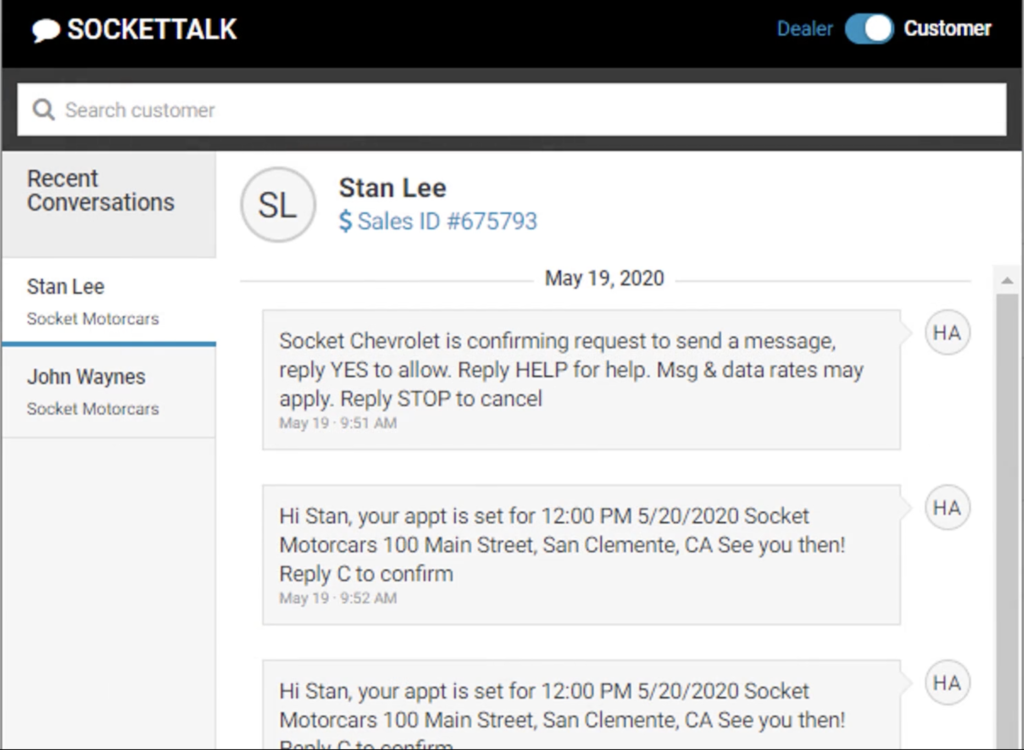CRM: Critical Dealer Tool
Why is CRM not included in the digital retailing discussion?
While there is plenty of attention on digital retailing during the pandemic, there has been little attention paid to how CRM help dealers navigate this period of social distancing. But it’s understandable. The CRM isn’t the new shiny object like digital retailing, and COVID-19 certainly reignited the digital-retail discussion. However, there’s no doubt of the importance of appointment-setting during COVID-19, especially for dealerships located in markets where sales were limited to appointment-only. It’s an art that predates the CRM, but, thanks to that important front-end tool, appointment-setting has become a science for some operations.

What often gets overlooked is just how often CRM providers update this critical tool. In DealerSocket’s case, the cadence is every two weeks. And the focus of late for DealerSocket is appointment-setting, with texting now a key component, thanks to dealer feedback.
Auto Buyers Prefer Texting
Recently, a California dealership customer began sending every internet lead received an initial opt-in text. If there was no response within a few minutes, the following text message — one that garners a response 70% of the time — was sent, “We just received your internet request, and we have a few questions. Do you prefer a call or a text?”
That dealership sent and delivered 26,617 texts.
Then there’s Rashad Tillman, who manages a centralized BDC for a two-rooftop independent group in Southern California. With a keep-it-simple approach, he operates under the belief that a successful road to the sale requires five yeses from a customer. The use of DealerSocket’s SocketTalk texting tool usually accounts for two of those yeses, starting with the opt-in text.
“All we’re looking for is a reply. Once we get one, we’re in control,” Tillman says. And once a customer opts in, the following text is sent, “’We received your lead for the [make and model], which we have available. Do you have time today to test-drive the vehicle?’”
“That usually results in a reply,” Tillman says. “I’ve been working with DealerSocket’s CRM for seven years now, and I figured out real early that texting is now the primary form of communication. So, we try to eliminate as much conversation as possible.”
In one month, Tillman’s 20-member team sent and received 59,402 text messages through the CRM’s SocketTalk texting tool, with two members logging 2,900 sent and received texts for the month. Tillman notes that texting accounts for 80% of his department’s activity when working a lead, which is he says knowing how to configure DealerSocket’s CRM dashboard correctly is critical to making sure no opportunity falls through the cracks.
Better Manage Leads and Opportunities
With DealerSocket’s CRM, managers don’t have to dig into the solution’s reporting tools to keep tabs on their team’s lead-handling activities. Merely creating a dashboard widget for web leads allows managers like Tillman to keep tabs on every opportunity and every text or email exchange. That’s where he says most managers go wrong. They have the talent and skills, but they resist to allow technology to augment their abilities.
In fact, the use of technology is how managers like Tillman are keeping their dealerships in the game when today’s car buyers are shopping more brands, more vehicles, and more dealerships than those car-buyer studies predicted they would four to five years ago. The latest data on that front comes from a study commissioned by Urban Science, which showed that the average car shopper is considering 2.6 brands, visits 2.5 dealerships, and submits, on average, three lead forms.
Regardless of whether your BDC staffers or sales teams are selling appointments or demonstrating to customers a willingness to be shopped to win their business, converting a lead into an appointment requires a CRM-driven process that doesn’t end once the customer says, “yes.”
The best part of a CRM-driven appointment-setting process is that it can be automated every step of the way. In the case of DealerSocket, our CRM’s Campaign Manager allows you to assign your operation’s best word-tracks to a BDC staffer’s scheduled response to an inquiry. It can also automate appointment reminders, confirmation communications, and follow-ups. Then there’s the CRM’s Business Rules automation tool. This allows managers to initiate activities such as vehicle prep and enrollment of customers into appropriate campaigns.
With this, CRM should be included in the digital retailing discussion. When a customer structures a deal through your website’s digital retail tool and submits their information, the question dealers need to answer is, “what does the experience look like when it does?”